By
Eric Vandenbroeck and co-workers
The Cold
War part two
Having earlier taken a deep dive into Russian
history decided to take a close look at the
dynamics of the Cold War and the making of Putin.
The Bay of Pigs invasion and the coming
of Gagarin.
The Bay of Pigs
invasion, for those who stormed a small stretch of the Cuban coastline on
April 17, 1961, was a turning point in the fight against an oppressive
communist regime, one that, some argue, still carries an outsized impact
on national elections in the United States. Those who survived the
beach landing and the subsequent wave of executions, over a thousand men, were
held in Castro’s jails for a year and a half before being exchanged for a $53
million ransom
of baby food and medicine from Washington.
The Cuban fiasco infuriated
Kennedy. In public, he took responsibility; in private, he lambasted the
military and the CIA for persuading him that the operation had a chance of
success. The CIA director, Allen Dulles, and members of his senior staff took
early retirement. While Fidel Castro and Ché Guevara
looked on with glee, Nikita Khrushchev cabled from Moscow to say that the USSR
would not allow the US to enter Cuba, hinting that a further attempt would
bring nuclear retaliation against US cities. The Bay of Pigs made America look
mendacious, untrustworthy, and – worst of all – incompetent and weak.
From a beleaguered
White House, John Kennedy watched the Soviet rejoicing and came to a decision
that would define his presidency. ‘The adversaries of freedom possess a
powerful intercontinental striking force, large forces for conventional war,
and long experience in the techniques of violence and subversion,’ he told the
US Congress on 25 May. ‘It is a contest of will and purpose as well as force
and violence, a battle for minds and souls as well as lives and territory. And
in that contest, we cannot stand aside.’ The priority was to win the present
war of nerves in order to avoid ceding the commanding
heights in a future war of arms.
Meanwhile, Yuri
Gagarin (the first human in space) was on a global tour, visiting Brazil,
Bulgaria, Canada, Cuba, Czechoslovakia, Finland, Great Britain, Hungary,
Iceland, and India. More than a million people lined the streets of Calcutta to
greet him.13 In Britain, he mingled with factory workers in Manchester and met
Queen Elizabeth II at Buckingham Palace. The Times reported that he received ‘a
welcome bordering on hysteria’.
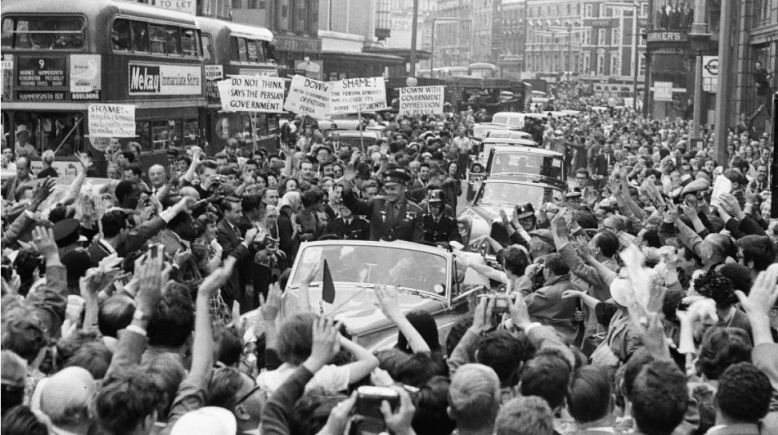
The fulfillment of John
Kennedy’s 1961 promise to ‘land a man on the Moon and
return him safely to Earth’ marked the finishing line in the space race. In the
intervening years, both the military and the psychological balance had tilted
in Washington’s favor. The time seemed to have come for cooperation to replace
rivalry. As early as the Vienna summit of 1961, Kennedy had
proposed a joint space mission with the Soviets, and he did so again in
a speech to the UN General Assembly on 20 September 1963. Soviet self-assurance
at the time and Kennedy’s assassination two months later meant a joint Moon
mission would not happen. But contacts at the level of science – and between
astronauts and cosmonauts – continued.
Neil Armstrong met with Yury
Gagarin’s widow after the Soviet cosmonaut’s untimely passing. He was also
the first foreigner to set foot in the hypersonic “Soviet Concord” and even had
the opportunity to cook ukha soup on the shores of
the Siberian “sea”.
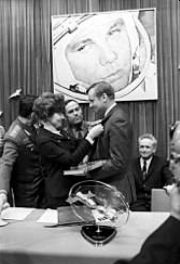
As we have seen Gorbachev next gambled on
his relationship with the West. He had banked on securing concessions for
the Soviet Union in exchange for allowing the peaceful collapse of socialism in
eastern Europe. But he had misread the psychology of the Cold War. The brief
interlude of warm personal relations with Ronald Reagan and Margaret Thatcher
persuaded him that the West might offer the USSR a way out of its dire economic
and social predicament. But four decades of entrenched hostility could not be
wiped away. With the communist monster at their mercy, the western powers were
hardly going to take their foot off its throat.
Well covered in
Michel Eltchaninoff’s Dans la tête de
Vladimir Poutine (2015; translated as Inside the Mind of
Vladimir Putin, 2018). According to Eltchaninoff,
Putin told Paris Match in 2000 that he “loved to read the
Russian classics, especially Dostoevsky and Tolstoy”. All very vague, of
course, but in 2006 when Putin unveiled a statue to Dostoevsky in Dresden, site
of his former KGB posting, he stressed that Dostoevsky’s message had been human
harmony and that the present occasion signified “that we live in a unified
European cultural space”. The positive post-Cold War sentiment echoed
Gorbachev’s 1987 formulation of “our common European home”.
In December 2000,
Vladimir Putin marked the first anniversary of his ascent to the Russian
presidency by bringing back the old Soviet national anthem. It is a rousing
patriotic hymn that stirs emotions, but its identification with the era of
communism meant there were protests at its reinstatement, albeit with new
words.1 Putin justified his decision in a long-unpublished interview with the
filmmaker Vitaly Mansky. ‘I was in Ulyanovsk,’ Putin says on camera, twenty
years ago!’ Well, what can you say to that? To go back is impossible. Neither our youth nor the old days
can ever return. But it is essential to rebuild people’s trust in their
leaders. You need to make people feel that not everything has been snatched
away from them. The vast majority of the population
feels nostalgic for that time [the Soviet era]. You can’t simply take
everything away from them. I think of my parents, this part of their lives. Can
we just throw all this away, root and branch, as if they never lived? (Mansky’s
interview with Putin was recorded in 2000 and included in his 2018 film Svideteli Putina (‘Putin’s
Witnesses’).
The old certainties
were gone. The old world had vanished. In East and
West alike, people faced an unsettling psychological challenge of adaptation.
When Bill Clinton struggled with the ambiguities of modern international
relations during the 1993 Somalia crisis, he exclaimed, ‘Gosh, I miss the Cold
War!’2 In the new era of uncertainty, memories of the past would be recast and
at times manipulated. They would be deployed by politicians, writers and
agitators for purposes of reassurance and of deception. George Kennan proved to
be a shrewd analyst of the Russian character. As early as 1947, he had
suggested that it had become distorted under the Soviet system, leaving
precarious psychological foundations. ‘The present generation of Russians have
never known spontaneity of collective action,’ Kennan warned in his article
‘The Sources of Soviet Conduct’. ‘If, consequently, anything were
ever to occur to disrupt the unity and efficacy of the Party as a political
instrument, Soviet Russia might be changed overnight from one of the strongest
to one of the weakest and most pitiable of national societies.’3 The end of the
Cold War and the collapse of the Communist Party of the Soviet Union would
demonstrate how right Kennan had been. Millions in Russia were left without
savings, without jobs, and without hope, bereft of any conception of what their
lives now meant. The land they had called their home, the social and political
ideals to which they had dedicated their existence, had vanished overnight. ‘It
seems to me that we lack an aim,’ lamented Natalya Pronina, one of many who
felt lost in the new Russia. ‘If before we had a goal, communism – even if it
was an unobtainable one – we at least had a purpose. However, there’s none
now.’4 Their society had failed, so they too had failed. Memories became
meaningless – bitter reminders that they had been part of an evil age. It is
not hard to understand why so many of the older generation clung forlornly to
an idealized version of the past, desperate to rehabilitate it – and themselves.
The man they blamed for destroying their country and blighting their lives
struggled to rationalize what he had done. Mikhail Gorbachev was torn between
the adulation he received from a grateful West and contrition for the suffering
of his countrymen. In 1992, he spoke from the same podium in Fulton, Missouri,
where Winston Churchill had given his ‘Iron Curtain’ speech forty-six years
earlier. The end of the Cold War, Gorbachev suggested, could offer an
opportunity for worldwide reconciliation, a new paradigm in which ‘the idea
that certain states or groups of states could monopolize the international
arena is no longer valid’. To reach ‘the exalted goal’
of peace and progress for all, however, would require greater wisdom than had
been shown in 1945. The Cold War had been presented to people in East and West
as ‘the inevitable opposition between good and evil – with all the evil, of
course, being attributed to the opponent’. Now both sides would need to
‘dispense with egoistic considerations’ in order to
secure a better future.5
Gorbachev was in
denial. Haunted by the harsh fate his actions had inflicted on his homeland, he was appealing for the same concessions from the
West that he had failed to win when he had cards to play and reciprocal
concessions to offer. Now he was out of power and impotent: America was hardly
likely to ‘dispense with egoistic considerations’, however eloquently Gorby
pleaded. On the contrary, George H. W. Bush had placed national egotism and a
world in which ‘certain states [i.e. the USA] would monopolize the
international arena’ at the top of his to-do list. ‘For the Cold War didn’t
end; it was won,’ Bush told the US Congress. ‘We are the United States of
America, the leader of the West that has become the leader of the world … Moods
come and go, but greatness endures.’6 In Bush’s telling, humanity had reached
the End of History: American ideals of liberal democracy and capitalism had
triumphed; from now on, it would be a unipolar world.
Gorbachev was not
alone in appealing to Washington to be magnanimous in victory. Pope John Paul
II, himself a long-standing
opponent of communist oppression in his Polish homeland, called on the West
to respond constructively to the end of the Cold War, to ‘avoid seeing this
collapse of communism as a one-sided victory of their own economic system and
thereby failing
to make the necessary corrections in that system’.8
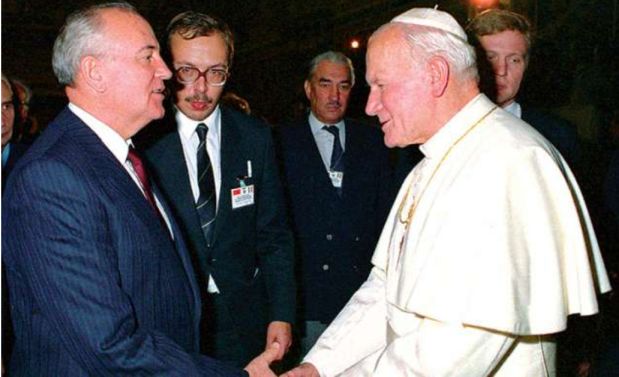
The Cold War was a
time of tension, fear, and danger, but because it ended in ‘victory’ for the
West, it came to be viewed with nostalgia.
But the problem with
viewing the past as a righteous crusade is that it suggests there are no
lessons to learn from it. And a gloriously celebrated triumph makes what
follows a disappointment. Western figures whose formative years were lived in the good-versus-evil world of the Cold War
found it hard to adapt.
Soviet society had
followed the pattern of denial to the very last moments of its existence. The
Brezhnev years were founded on blocking out the legacy of the past and the
decay of the present. By the time Mikhail Gorbachev came to power, ready to
face reality, it was too late. The USSR experienced the fate that Karl Marx had
predicted for bourgeois capitalism. ‘All that is solid melts into air,’ Marx
and Engels had written in their Communist Manifesto. ‘And man is at last
compelled to face with sober senses his real conditions of life, and his
relations with his kind.’20 The man who set about restoring Russia to what he
deemed its rightful place at the top table of international politics also had a
Stasi file. But Vladimir Putin’s record was as a perpetrator, not a victim.
Putin had been a KGB representative in East Germany in the late 1980s, posted
in Dresden in the so-called ‘Valley of the Clueless’ where West German TV could
not be received.
The suggestion is
that Putin must have slipped up to end up in such a relatively unimportant
post, and by his own admission, he spent
much of his time drinking beer.
Although he much
prefers to drink Dresden’s Radeberger Pilsner.
"Angela sends me some bottles of Radeberger beer
from time to time," says the
Kremlin chief in the film. Putin was previously stationed in Dresden as an
agent of the Soviet secret service KGB.
He would remember the
disintegration of the Soviet empire as a formative time in his life. His
official biography, produced in short order in 2000 to give the Russian people
an idea of who their new president was, helped explain why. It described a
dramatic episode in late 1989, when a baying crowd threatened to invade the
KGB’s Dresden headquarters. Putin, then a lieutenant colonel, tried desperately
to contact Moscow for guidance on what to do, only to be told that Gorbachev
was asleep and ‘we cannot do anything without orders’.
‘I got the feeling that the country no longer existed,’ Putin recalled. That it
had disappeared. It was clear that the Union was ailing. And it had a terminal
disease without a cure – a paralysis of power. Intellectually I understood that
a position based on walls and dividers could not last. But I wanted something
different to rise in its place. And nothing different was proposed. That’s what
hurt. They just dropped everything and went away.
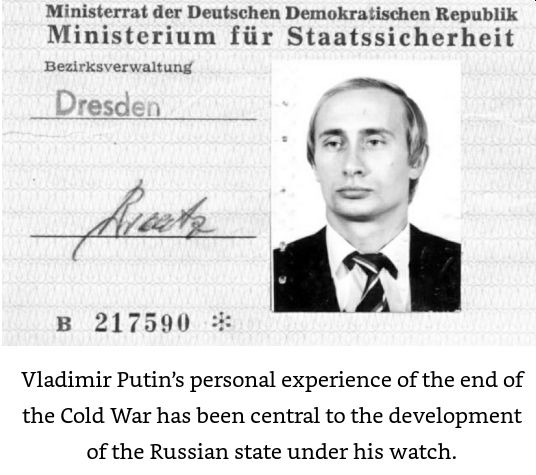
Putin had lived
through events that can trigger what German psychiatrist Michael Linden described
as Post-Traumatic Embitterment Disorder (PTED). Closely related to PTSD, PTED
causes bitterness, hostility and aggression in sufferers following sudden
upheavals in their lives.
Deprived of the
cognitive schemata that had given shape to their lives, millions of people had
been left unable to find their place in the world.
Such emotions about
the chaotic state of post-Soviet Russian society may throw light on Vladimir
Putin’s behavior since coming to power at the end of 1999. Motivated by anger
at Gorbachev’s ‘betrayal’, he concluded that it was imperative to find ‘something
different’ if Russia were to survive one of the hardest periods in its
history.’ He feared that, without a vast effort, Russia would lose its place in
the top tier of global powers.
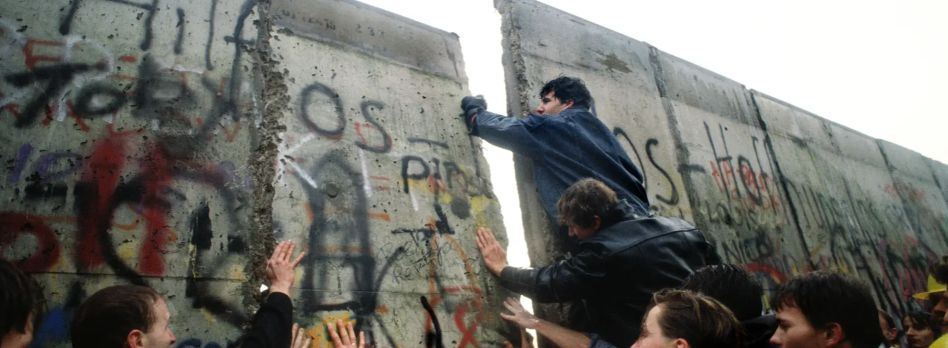
He witnessed
protesters occupying the Dresden Stasi headquarters, while communist security
forces came close to opening fire on them, on 5 December 1989.
Jubilant East
Berliners had already breached the Berlin Wall in November. Putin was
fluent in German at the time and has said he personally calmed the Dresden
crowd when they surrounded the KGB building there, warning them that it was
Soviet territory.
During his KGB
service in Dresden, Putin was promoted to the rank of lieutenant
colonel. In 1989 he was awarded a bronze medal by communist East Germany -
officially the German Democratic Republic (GDR) - "for faithful service to
the National People's Army", the Kremlin website says.
In June 2017 Putin revealed
that his work in the KGB had
involved "illegal intelligence-gathering". Speaking on Russian state
TV, he said KGB spies were people with "special qualities, special
convictions and a special type of character".
During the Munich
Security Conference of 2007, Putin stated: ‘I am here to say what I really
think about international security problems,’ he told his fellow world leaders.
Just like any war, the Cold War left us with live ammunition, figuratively
speaking. I am referring to ideological stereotypes, double standards, and
other typical aspects of Cold War bloc thinking. The unipolar world that had
been proposed after the Cold War is one in which there is one master, one
sovereign … the United States has overstepped its national borders in every
way. This is visible in the economic, political, cultural, and educational
policies it imposes on other nations. Well, who likes this? Who is happy about
this? A world order dominated by the US was bad for Russia, Putin said, but it
was equally harmful to America itself. He listed areas of concern including
western interference in other states, the West’s development of strategic
conventional military capabilities, US missile defense plans, and NATO
expansion and ‘aggression’. ‘At the end of the day this is pernicious not only
for all those within this system,’ he concluded, ‘but also for the sovereign
itself … because it destroys itself from within.’ Seven years later, when the
West complained about Russia’s seizure of Crimea, Putin commented acidly, ‘It’s
a good thing they at least remember that there exists such a thing as
international law – better late than never!’
A poll carried out in
2018 found that two-thirds of those asked regretted the collapse of the Soviet Union.* It was, wrote the historian, playwright, and
novelist Svetlana Boym, ‘a restorative nostalgia that
… does not think of itself as nostalgia, but rather as truth and tradition. It
knows two main plots – the return to origins and the conspiracy.’ Putin’s
approach claimed to be more nuanced. ‘Whoever does not miss the Soviet Union
has no heart,’ he wrote in 2010. ‘Whoever wants it back has no brain.’ It was a
formula that allowed a dubious past to be utilized without questioning its true
character.
When a Russian
fighter in the so-called Donetsk People’s Republic in eastern Ukraine was asked
what he was fighting for, he instinctively reached for the memory myth that
Putin and others had done much to create. ‘We need to rebuild the country,’ he
told the Guardian’s Shaun Walker. ‘The Soviet Union, the Russian Empire, it
doesn’t matter what you call it. I want a Russian idea for the Russian people;
I don’t want the Americans to teach us how to live. I want a strong country, one you can be proud of. I want life to have some
meaning again.’
The practice of
defining oneself in opposition to an external enemy was common to both sides.
James Clapper, a
former director of national intelligence, drew on the preposterous excesses of
the McCarthy era when he declared in 2017 that ‘Russians are almost genetically
driven to co-opt, penetrate, gain favor. It’s in their genes to be opposed, diametrically
opposed, to the United States and western democracies.’
The Kremlin was
convinced – and told the Russian people – that the unrest in Ukraine, Georgia
and elsewhere that occurred throughout the 2010s was stoked by the CIA. Whether
the distortion of memory by the new Cold Warriors stemmed from conviction or
was the result of deliberate role-playing,* its
real-world consequences were the same. Putin no longer pretended that his
Russia was a liberal democracy. He painted the West as corrupt, with bogus
elections and no freedom of speech, a stark contrast to the moral righteousness
of his homeland. He based his legitimacy and his international swagger on
confronting the decadent ‘other’, and it made him very popular. A Russian
journalist, Mikhail Zygar, wrote that ‘Putin has
restored a sense of pride.
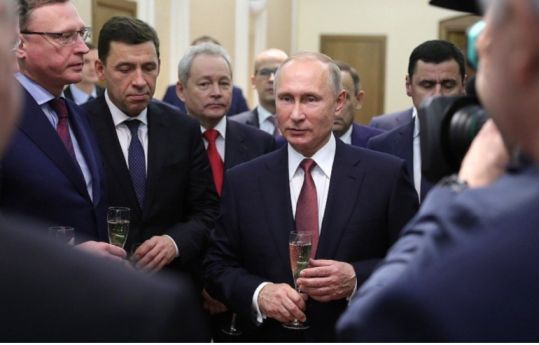
Putin was vaunting
Russian military strength in order to dissuade the
Americans from pursuing their destabilizing missile defense plans. The logic of
the man in the White House was less easy to discern. Donald Trump began his
presidency with declarations of awed admiration for nuclear weapons and the
destructive power they would put at his disposal. In the final Republican
candidate debate in December 2015, he was asked what his nuclear priorities
would be as president. ‘For me,’ Trump replied, ‘nuclear – just the power, the
devastation – is very important to me.’ During the election campaign of the
following year, he seemed to endorse the premise of Nixon’s ‘madman theory’,
telling an interviewer, ‘I’m never going to rule anything out.
Even if I wasn’t, I wouldn’t want to tell you that, because at a minimum, I
want them to think maybe we would use [nuclear weapons], OK?’ As Trump’s
presidency ended in January 2021, after a disastrous riot that saw the Capitol
building overrun by his supporters, the madman theory seemed perilously close
to reality, with house speaker, Nancy Pelosi, calling General Mark Milley, the
chairman of the joint chiefs of staff, ‘to discuss available precautions for
preventing an unstable president from initiating military hostilities or
accessing the launch codes and ordering a nuclear strike’. The unpredictability
of the man in the White House made it harder – and all the
more crucial – for each side correctly to read the signals coming from
the other. Rear Admiral John Gower, a former head of the British Ministry of Defence’s nuclear weapons policy team, was tasked with
examining the psychology of how East and West project their military intentions
to each other.
Neither side will
make informed decisions under these conditions. The risk of unleashing a war
from which the globe will not recover remains real, long after the Cold War is
supposed to have ended.
After returning to
Russia, Putin rose to become head of the Federal Security Service (FSB) - the
main successor to the KGB. He became Russian president in 2000.
A Russian serviceman
fires a Verba air defense system during an exercise at Opuk
range in Crimea;
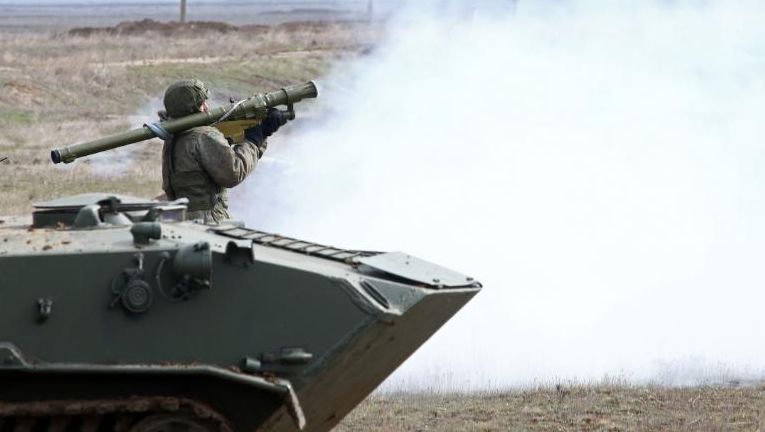
The nostalgia people
feel for the Soviet Union is less to do with military
power and confronting the West than with the sense of security they had about
their lives. They missed a time when the price of ice creams
and sausages didn’t change. The 1990s, by contrast, brought runaway inflation,
and the pension reforms of 2018 heaped added misery on the already straitened
lives of elderly people. In the USSR, people felt they lived in a superpower,
in which their lives would not be upended from one day to the next (except, of
course, that they eventually were). ‘Nostalgiya po SSSR’
(‘Nostalgia for the USSR’).
The Cold War was a
time of tension, fear, and danger, but because it ended in ‘victory’ for the
West, it came to be viewed with nostalgia. Whereby the next
'cold war' might be of a different character.
While NATO
warns Russia over Ukraine's military build-up Russia is planning to go
ahead with deploying a new paratroop regiment on annexed Crimea next month and
criticized a British agreement to boost Ukraine's navy. Russia's military
said it would establish the new regiment on the peninsula Russia annexed
from Ukraine in 2014,
completing a reshuffle of forces touted by Defense Minister Sergei Shoigu in
March, the Interfax news agency reported.
At the same time, Moscow
voiced its objections to a framework agreement under which Ukraine will use
British financing to enhance its naval capabilities, allowing it to buy
missiles and build missile ships and a navy base on the Sea of
Azov. "We see this fact as the latest practical evidence of
increasing British military activity in the states bordering Russia, in
particular Ukraine," Russia's Foreign Ministry spokesperson Maria
Zakharova told a weekly briefing.
Whereby it should
once more be emphasized that there are different versions about when the Cold
War would have started, there is the Western version which we have mentioned
above, yet this contrasts with the version that is thought in Russia including
as thought to all Russian diplomats and graduates of the Foreign
Intelligence Academy of the SVR (Foreign Intelligence Service).
The story they are
thought is that the Cold War started following a coup orchestrated by the
US and the UK to topple the Lenin regime and kill Lenin. This idea was started
by Secretary of State Lansing when he told
President Wilson on 10 Dec. 1917 that the only hope for Russia lay in
setting up a “military dictatorship.” Lansing’s idea was to choose one man and
make him the boss of Russia on the side of America and the Allies. And in turn,
David R. Francis, the American ambassador to Russia, asked Washington for 100,000 troops to take
Petrograd and Moscow to support the coup against Lenin.
To this comes as we
will show in our upcoming new case study about the First World War
that The First World War had profound global importance. It led to the
collapse of four of the world’s most powerful empires, namely those of Russia,
Austria-Hungary, Germany, and the Ottomans. It almost bankrupted the French and
British empires. It occasioned the Russian revolutions of 1917 and brought the
Soviet Union into being. It confirmed that the United States and Japan had
become powerful industrial and imperial states.
The war was carried
on the winds of global commerce, finance, and information exchange and was won
by those who most effectively mobilized the available human and material
resources. As a result, neutral and belligerent civilians were both victims and
instruments of this total global war.
Putin himself is a
graduate of the Foreign Intelligence Academy of the SVR (Foreign Intelligence
Service). It started to show some of his cynicism by insisting that
Russians who point out human rights violations in their country constitute a
fifth column serving hostile powers. Any nonprofit organization that receives
donations from sources outside Russia and engages in “political activity” has been
legally required since
2012 to identify itself as a “foreign agent” - a term equivalent in Russian to “foreign spy.”
This toxic label must appear on every publication, every video, every website,
and public event sponsored by such organizations. The Russian chief
prosecutor claims that because Memorial failed to include the
“foreign agent” label on certain pages of its website and on sure of its
publications (including some that were produced before it was branded a
“foreign agent”), the organization should be liquidated. In addition,
Memorial is charged with “justifying terrorism and extremism”
because some of the more than 400 individuals it lists as current “political
prisoners” - among them the jailed anti-corruption activist Alexei Navalny - are considered by the Kremlin to have engaged
in such activity.
Memorial has a tone
to tell the sober, carefully documented truth to the Russian public. Sakhaargueargued that human rights, specifically free
speech and the free flow of information, were vital preconditions of good
governance. Only policies based on “deep analysis of facts, theories, and
views, presupposing unprejudiced, fearless, open discussion and conclusions”
could secure a society’s interests in the long run. Natalia Solzhenitsyn
agrees. The widow of the acclaimed writer, Gulag survivor, and Nobel laureate
Alexander Solzhenitsyn has declared that “the closure of Memorial will cause direct
and severe damage to both society and the state.” Russian journalist Dmitri
Muratov, this year’s co-recipient of the Nobel Peace Prize, says that Memorial is “not an enemy of the people, it
is a friend of the people,” the “most important antidote against repressions.”
When he first came to
power, Putin appeared to share these sentiments. “There should always be people
who criticize the authorities,” he told National Public Radio in 2001. “At the end of
the day, it is good for the authorities because what these people are trying to
do is casting light on a problem from a perspective that the authorities
themselves may fail to notice.” He continues to talk like this, including at
the dedication in 2017 of “The Wall of Grief,” a national monument to the
victims of Soviet terror. Under Putin, public monuments to both Sakharov and
Solzhenitsyn have been erected. But these and similar gestures have become part
of a peculiar “hybrid warfare” strategy, directed at Russian society rather than
the West. Even as Putin pays public lip service to the victims of Soviet
repression, his government is dismantling all genuinely independent sources of authority within
Russia. In Memorial’s case, this involves the Orwellian tactic of invoking the
battle against terrorism to prosecute an organization dedicated to documenting
Soviet state-sponsored terror and making sure nothing as it recurs.
How is it that an
association formed by and for the descendants of the roughly 18
million Soviet citizens sent
to Stalin’s Gulag - several million of whom never returned - gets stigmatized
as a “foreign agent”? “We are not agents of anyone,” Memorial’s executive
director, Yelena Zhemkova, announced at a recent news conference. “We ourselves
decide what and how to work.” In Putin’s Russia, that ethos is now an
endangered species.
For updates click homepage here